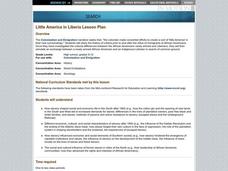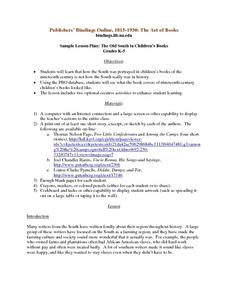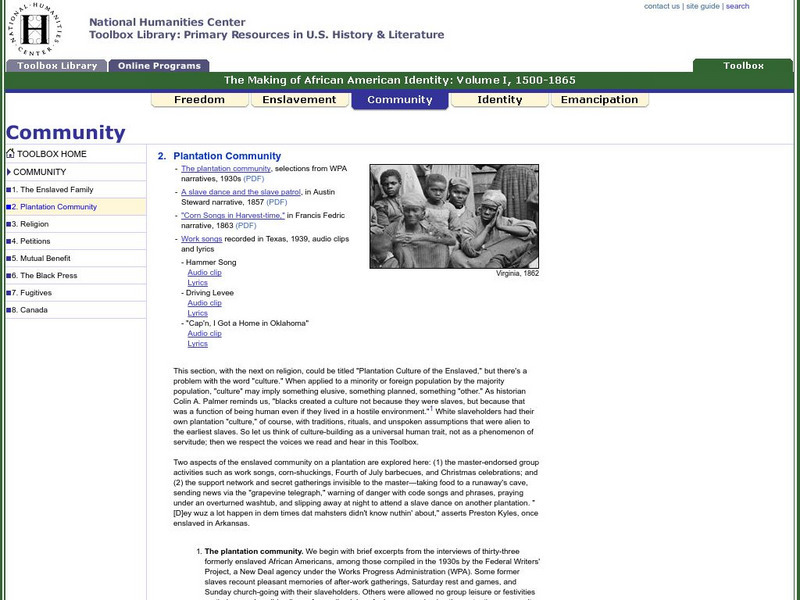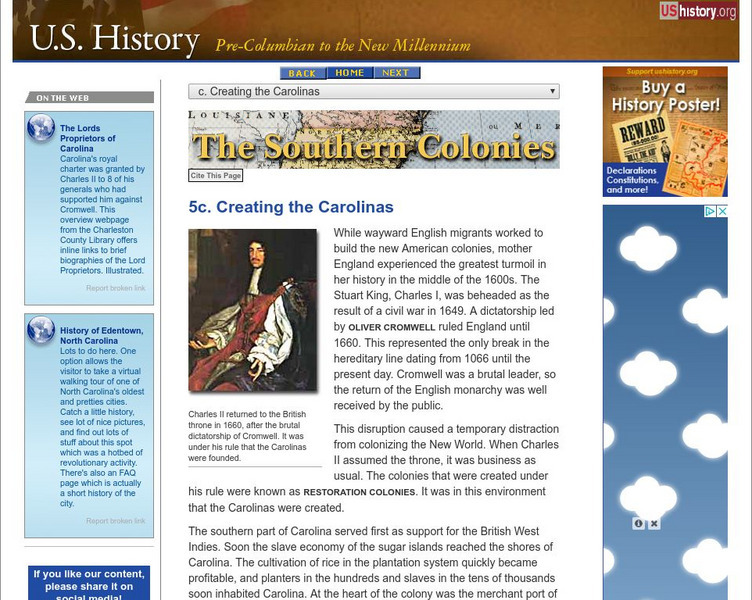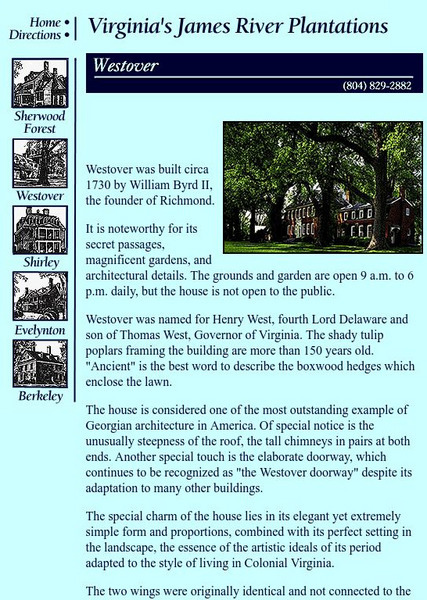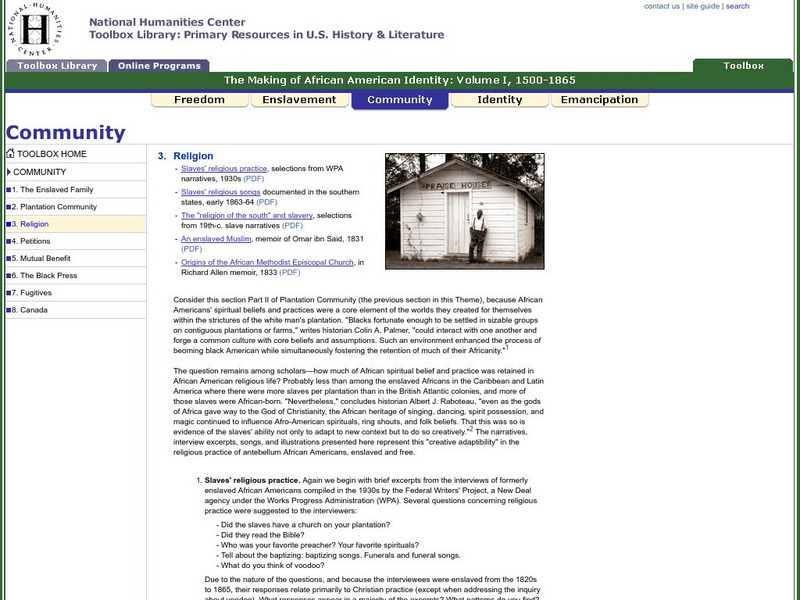Curated OER
Differences in Location Lesson Plan: Treatment of Early African Americans
Students reach The Domestic Slave Trade, then examine the differences between the people enslaved in North America as opposed to those in Brazil.
Curated OER
Forest Joe Lesson Plan: Outlaw or Hero?
Students become familiar with an American legend that is unfamiliar to many. Presented with the legend of Forest Joe, a runaway slave who, much like Robin Hood, stole from the rich to give to the poor, students draw comparisons and...
Curated OER
African American Emigration: Turner and McNeal
Learners discuss reasons why African Americans may have wanted to emigrate from the United States followig the Civil War. They complete a Venn diagram noting the differences between proposals by Marcus Garvey and Henry McNeal Turner.
Curated OER
Little America in Liberia
Students study the history of Liberia prior to and after the influx of immigrants of African Americans. They investigate the cultural differences between the African Americans and newly-arrived Liberians.
Curated OER
Mixing Races in New Orleans
Students discuss the changes in the legal, social, and political status of African Americans and those of mixed ethnicity after reading the narrative, Haitian Immigration: Eighteenth and Nineteenth Centuries.
Curated OER
Voluntary Movement or Not? Africian-American Movement to the West
Ninth graders, in groups, determine reasons for African-American migration to the west
Curated OER
Transportation and African-American Migration
Students explore the means of transportation available in the 19th century and its role as both facilitator and enabler of the westward expansion. They create a project board illustrating their findings.
Curated OER
Trusting Statistics Lesson Plan
Students read a section of the Runaway Journey narrative and conduct a survey. They use survey statistics to question their validity and decide why a respondent might not answer truthfully.
Curated OER
Come One, Come All
Students analyze information from core map and other sources and construct routes from New York and Boston to Cincinnati as they might have existed in 1835.
Curated OER
Reconstruction on Life in Virginia
Eighth graders study the life style of Virginians during the Reconstruction Period after the Civil War. They examine how the infrastructure, the economy, and the agricultural status of Virginia and the other Confederate states changed...
Curated OER
Social Studies: Towne Planning in Tidewater
Young scholars discover how European values dominated colonial life. They also examine the effects of slavery in the Americas. Students compare the planning of their home town with that of colonial Williamsburg. They locate key sites...
Curated OER
The Old South In Children's Books
Students discuss what is meant by the "Old South". In groups, they read stories about the Old South and discover this was not how the area actually was in that time period. They use a database to examine the covers of books and...
Curated OER
Drawing on Kenaf
Students explore kenaf, a tree-free paper. In this environmental issues lesson, students draw pictures following a presentation about the origin and "eco-friendly" nature of kenaf.
CommonLit
Common Lit: "Life of a Slave on a Southern Plantation" by Bird Brain History
A learning module that begins with "Life of a Slave on A Southern Plantation" by BirdBrain History, accompanied by guided reading questions, assessment questions, and discussion questions. The text can be printed as a PDF or assigned...
Curated OER
National Park Service: Teaching With Historic Places: Plantation Agriculture
This resource lets you explore the workings of southern plantations.
Duke University
Plantation America: The Work of Slaves
On this webpage, the primary text contains selected entries from letters and journals. It also describes slaves delivering rice to Savannah, slave numbers, their condition on a plantation, how slaves were used, and a map and a drawing of...
National Humanities Center
National Humanities Center: Toolbox Library: Plantation Community, Making of African American Identity: V. 1
Various retrospective oral accounts from the early-twentieth century and two narratives from the mid-nineteenth century that examine the work, interrelationships, dangers, and lives of slaves on southern plantations.
Independence Hall Association
U.s. History: The Plantation and Chivalry
The Southern way of life fostered a social code of chivalry and genteelism. Read about what was considered honorable and proper for both aristocratic men and women.
Other
United States History: Ch. 3 Sec. 1: The Southern Colonies [Pdf]
A chapter from a history text that looks at the development of the Southern Colonies. It discusses the Southern agricultural economy that relied on slave labor, tobacco as a cash crop, Southern society, indentured servitude, Bacon's...
Curated OER
National Park Service: Plantation Agriculture: Coastal Rice
Brief description of coastal rice plantations in the late 18th and early 19th centuries from the National Park Service.
Independence Hall Association
U.s. History: Southern Colonies: Creating the Carolinas
Read about the founding of the Carolina colony as a place of plantations and aristocrats. See how the farmers in the northern part of Carolina chafed at the control of the rich in the south and split off into North and South Carolina in...
Other
James River Plantations: Westover Plantation
William Byrd built Westover, his plantation home. Here you can view photographs of it and learn of some details of interest.
Thinkport Education
Mpt: Exploring Maryland's Roots: The Colony Begins (1634 1640)
In-depth site includes videos and interactive learning activities to help you learn more about Maryland as it was being founded. Play the game that lets you build your own plantation and find out all the problems colonists faced in...
National Humanities Center
National Humanities Center: Toolbox Library: Religion, Making of African American Identity: V. 1
A series of songs, narratives, and memoirs that examine the spiritual beliefs of and experiences with religion among slaves in southern plantation communities.





